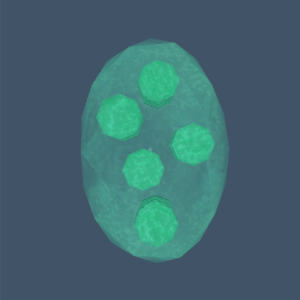Chloroplast: Difference between revisions
(Fill out Chloroplast page) |
Oliveriver (talk | contribs) (Formatting and wording updates) |
||
| Line 16: | Line 16: | ||
}} | }} | ||
Filled with a green pigment called | Filled with a green pigment called chlorophyll, it uses the energy gathered from '''Sunlight''' {{CompoundIcon|image=SunlightIcon.png|internalName=sunlight}} to produce '''Glucose''' {{CompoundIcon|image=GlucoseIcon.png|internalName=glucose}} from water and gaseous '''Carbon Dioxide''' {{CompoundIcon|image=CarbonDioxideIcon.png|internalName=carbondioxide}}. This process is called '''Photosynthesis'''. | ||
As '''Photosynthesis''' requires '''Sunlight''' {{CompoundIcon|image=SunlightIcon.png|internalName=sunlight}} to work, it is only effective in surface patches. | As '''Photosynthesis''' requires '''Sunlight''' {{CompoundIcon|image=SunlightIcon.png|internalName=sunlight}} to work, it is only effective in surface patches. | ||
This organelle is the eukaryotic counterpart to ''[[Thylakoids]]'''. | |||
== Requirements == | == Requirements == | ||
A cell must have a [[Nucleus]] to evolve '''Chloroplasts'''. | A cell must have a '''[[Nucleus]]''' to evolve '''Chloroplasts'''. | ||
If organelle unlocks are enabled in game settings, the following condition must be true ''for the player cell'': | If organelle unlocks are enabled in game settings, the following condition must be true ''for the player cell'': | ||
* Contains at least '''5''' [[Thylakoids]] for at least '''7''' generations in a row. | * Contains at least '''5''' '''[[Thylakoids]]''' for at least '''7''' generations in a row. | ||
== Processes == | == Processes == | ||
| Line 32: | Line 34: | ||
'''Photosynthesis:''' '''Sunlight''' {{CompoundIcon|image=SunlightIcon.png|internalName=sunlight}} + '''Carbon Dioxide''' {{CompoundIcon|image=CarbonDioxideIcon.png|internalName=carbondioxide}} → '''Glucose''' {{CompoundIcon|image=GlucoseIcon.png|internalName=glucose}} + '''Oxygen''' {{CompoundIcon|image=OxygenIcon.png|internalName=oxygen}} | '''Photosynthesis:''' '''Sunlight''' {{CompoundIcon|image=SunlightIcon.png|internalName=sunlight}} + '''Carbon Dioxide''' {{CompoundIcon|image=CarbonDioxideIcon.png|internalName=carbondioxide}} → '''Glucose''' {{CompoundIcon|image=GlucoseIcon.png|internalName=glucose}} + '''Oxygen''' {{CompoundIcon|image=OxygenIcon.png|internalName=oxygen}} | ||
A full-strength version of '''Chromatophore Photosynthesis''' found in [[Thylakoids]]. This allows you to more efficiently taste the sun! Similarity to it's prokaryotic counterpart, '''Chloroplasts''' perform '''Photosynthesis''' only in light patches; the closer to the surface your cell is, the more effective this process becomes. | A full-strength version of '''Chromatophore Photosynthesis''' found in '''[[Thylakoids]]'''. This allows you to more efficiently taste the sun! Similarity to it's prokaryotic counterpart, '''Chloroplasts''' perform '''Photosynthesis''' only in light patches; the closer to the surface your cell is, the more effective this process becomes. | ||
== Modifications == | == Modifications == | ||
| Line 40: | Line 42: | ||
== Effects == | == Effects == | ||
No | No effects. | ||
== Upgrades == | == Upgrades == | ||
| Line 48: | Line 50: | ||
== Strategy == | == Strategy == | ||
'''Chloroplasts''' are the | '''Chloroplasts''' are the largest organelle other than the [[Nucleus]], with a high osmoregulation cost and weight. | ||
When playing with the day/night cycle enabled, a lot of '''Glucose''' {{CompoundIcon|image=GlucoseIcon.png|internalName=glucose}} | When playing with the day/night cycle enabled, a lot of '''Glucose''' {{CompoundIcon|image=GlucoseIcon.png|internalName=glucose}} storage is needed to survive the night. This can be provided by '''[[Vacuole|Vacuoles]]'''. See the strategy section for '''[[Thylakoids]]''' for more advice on surviving as a photosynthetic organism. | ||
== Scientific Background == | == Scientific Background == | ||
TBA | TBA | ||
Revision as of 15:05, 23 February 2024
Filled with a green pigment called chlorophyll, it uses the energy gathered from Sunlight ![]() to produce Glucose
to produce Glucose ![]() from water and gaseous Carbon Dioxide
from water and gaseous Carbon Dioxide ![]() . This process is called Photosynthesis.
. This process is called Photosynthesis.
As Photosynthesis requires Sunlight ![]() to work, it is only effective in surface patches.
to work, it is only effective in surface patches.
This organelle is the eukaryotic counterpart to Thylakoids'.
Requirements
A cell must have a Nucleus to evolve Chloroplasts.
If organelle unlocks are enabled in game settings, the following condition must be true for the player cell:
- Contains at least 5 Thylakoids for at least 7 generations in a row.
Processes
Photosynthesis: Sunlight ![]() + Carbon Dioxide
+ Carbon Dioxide ![]() → Glucose
→ Glucose ![]() + Oxygen
+ Oxygen ![]()
A full-strength version of Chromatophore Photosynthesis found in Thylakoids. This allows you to more efficiently taste the sun! Similarity to it's prokaryotic counterpart, Chloroplasts perform Photosynthesis only in light patches; the closer to the surface your cell is, the more effective this process becomes.
Modifications
No modifications.
Effects
No effects.
Upgrades
No upgrades.
Strategy
Chloroplasts are the largest organelle other than the Nucleus, with a high osmoregulation cost and weight.
When playing with the day/night cycle enabled, a lot of Glucose ![]() storage is needed to survive the night. This can be provided by Vacuoles. See the strategy section for Thylakoids for more advice on surviving as a photosynthetic organism.
storage is needed to survive the night. This can be provided by Vacuoles. See the strategy section for Thylakoids for more advice on surviving as a photosynthetic organism.
Scientific Background
TBA
